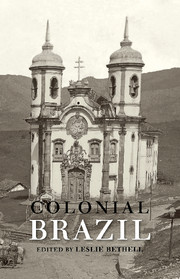Book contents
- Frontmatter
- Contents
- List of maps and figures
- Note on currency and measurement
- Preface
- 1 Portuguese settlement, 1500–1580
- 2 Political and economic structures of empire, 1580–1750
- 3 Plantations and peripheries, c. 1580 – c. 1750
- 4 Indians and the frontier
- 5 The gold cycle, c. 1690–1750
- 6 Imperial re-organization, 1750–1808
- 7 Late colonial Brazil, 1750–1808
- A note on literature and intellectual life
- Bibliographical essays
- Index
7 - Late colonial Brazil, 1750–1808
Published online by Cambridge University Press: 05 June 2012
- Frontmatter
- Contents
- List of maps and figures
- Note on currency and measurement
- Preface
- 1 Portuguese settlement, 1500–1580
- 2 Political and economic structures of empire, 1580–1750
- 3 Plantations and peripheries, c. 1580 – c. 1750
- 4 Indians and the frontier
- 5 The gold cycle, c. 1690–1750
- 6 Imperial re-organization, 1750–1808
- 7 Late colonial Brazil, 1750–1808
- A note on literature and intellectual life
- Bibliographical essays
- Index
Summary
If the years 1808–22, following the dramatic arrival of the Portuguese court at Rio de Janeiro, are considered for Brazil a period of transition from colony to independent empire, then the years 1750–1808 may be regarded as the last phase of Brazil's colonial experience. The era began as the mining boom was reaching its zenith; then, quite unexpectedly, the boom was over and an extended depression ensued. But Brazilians readjusted to the decline of the mineral sector by returning to agriculture, their traditional source of wealth. The result for coastal Brazil (but not the interior) was several decades of renewed prosperity based, in part, upon an expansion in the production of traditional staples, particularly sugar and tobacco, but also upon the development of new exports, especially cotton and rice, ás well as cacao, coffee, and indigo. That recovery was accomplished without any fundamental improvements in technology or alterations in the patterns of land tenure, but through the growth of old and new markets and an intensified reliance upon slave labour. During this period Brazil accepted without protest the crown's decision to expel her most respected missionary order (the Jesuits) and to restrict the role of the remaining religious bodies. Portugal fought and lost two wars to secure Brazil's southern boundaries, but a third conflict (1801) gained Brazil rich agricultural and pastoral lands in the temperate south. Colonial Brazil had reached her territorial limits. Though she virtually ignored the first American Revolution, Brazil became far more aware of the French Revolution.
- Type
- Chapter
- Information
- Colonial Brazil , pp. 284 - 343Publisher: Cambridge University PressPrint publication year: 1987
- 4
- Cited by



